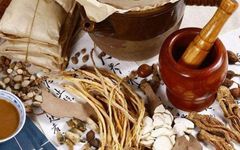Author: Zeng Anna, Chief Pharmacist, First Affiliated Hospital of Guangzhou Medical University
Editor: Luo Wei, Pharmacist, First Affiliated Hospital of Guangzhou Medical University
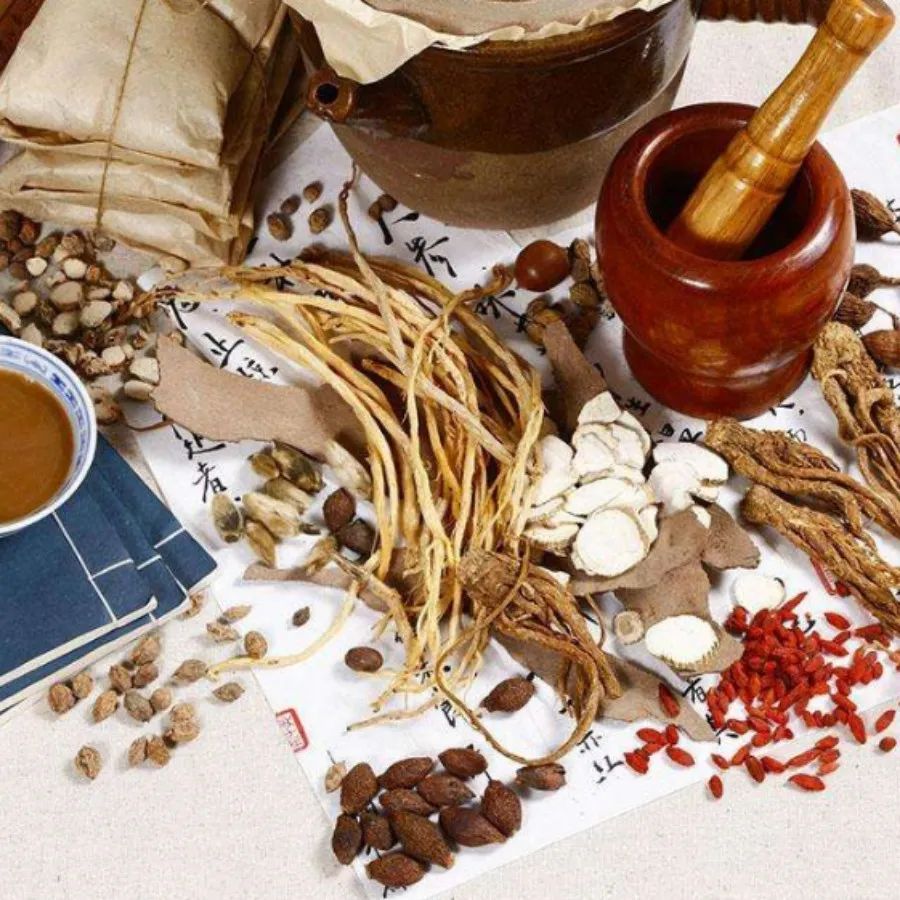
Traditional Chinese Medicine Decoction Powder
A cost-effective and labor-saving dosage form of traditional Chinese medicine
You may have heard of dosage forms such as tinctures, pills, pastes, powders, and decoctions, but does the term “decoction powder” sound both strange and familiar? You might ask, isn’t “decoction powder” just another form of powder?
The pharmacist will tell you that “decoction powder” and “powder” are two different dosage forms.
Let’s listen to the pharmacist’s explanation.

What is Traditional Chinese Medicine Decoction Powder?
It is a dosage form where medicinal materials are crushed to a certain particle size, packaged or measured for use, and then boiled with water or a guiding agent, taken together with the powder or strained. In 2018, the National Administration of Traditional Chinese Medicine published the “Directory of Classic Ancient Formulas (First Batch)”, which includes 23 decoction powders (details in the table below). Additionally, there are 5 formulas (Danggui Jianzhong Decoction, Wenshu Decoction, Wendan Decoction, Xiaoxuming Decoction, Sanhua Decoction) defined as decoctions, but their preparation process involves “crushing” or “chopping” before boiling, which essentially makes them decoction powders. The resource-saving and efficient decoction powder has high research and development value.
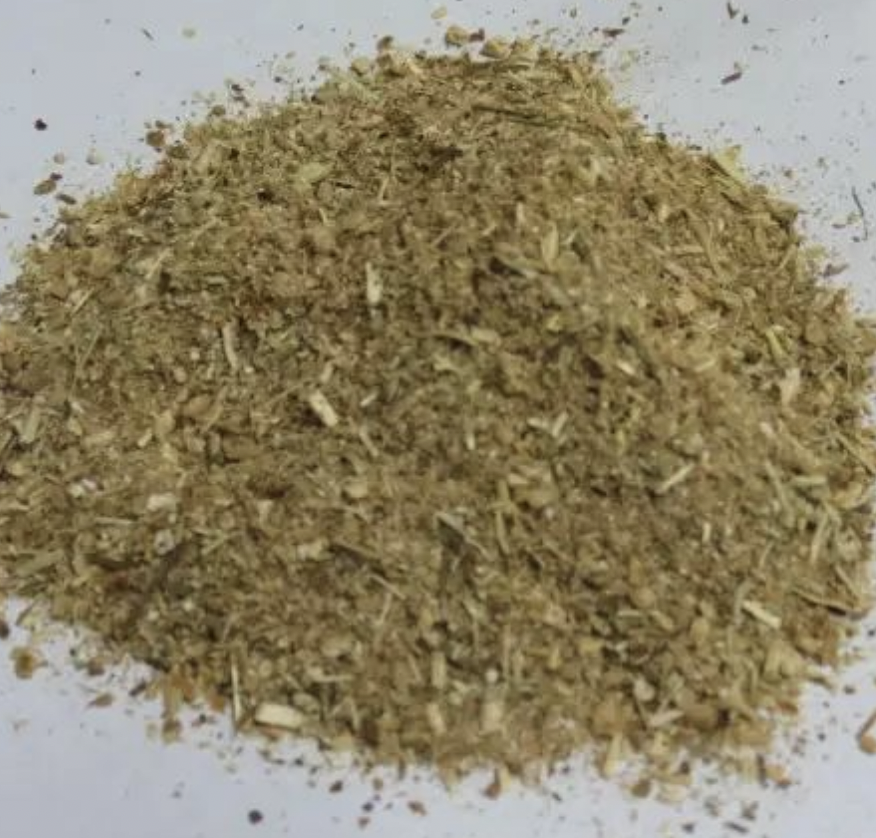
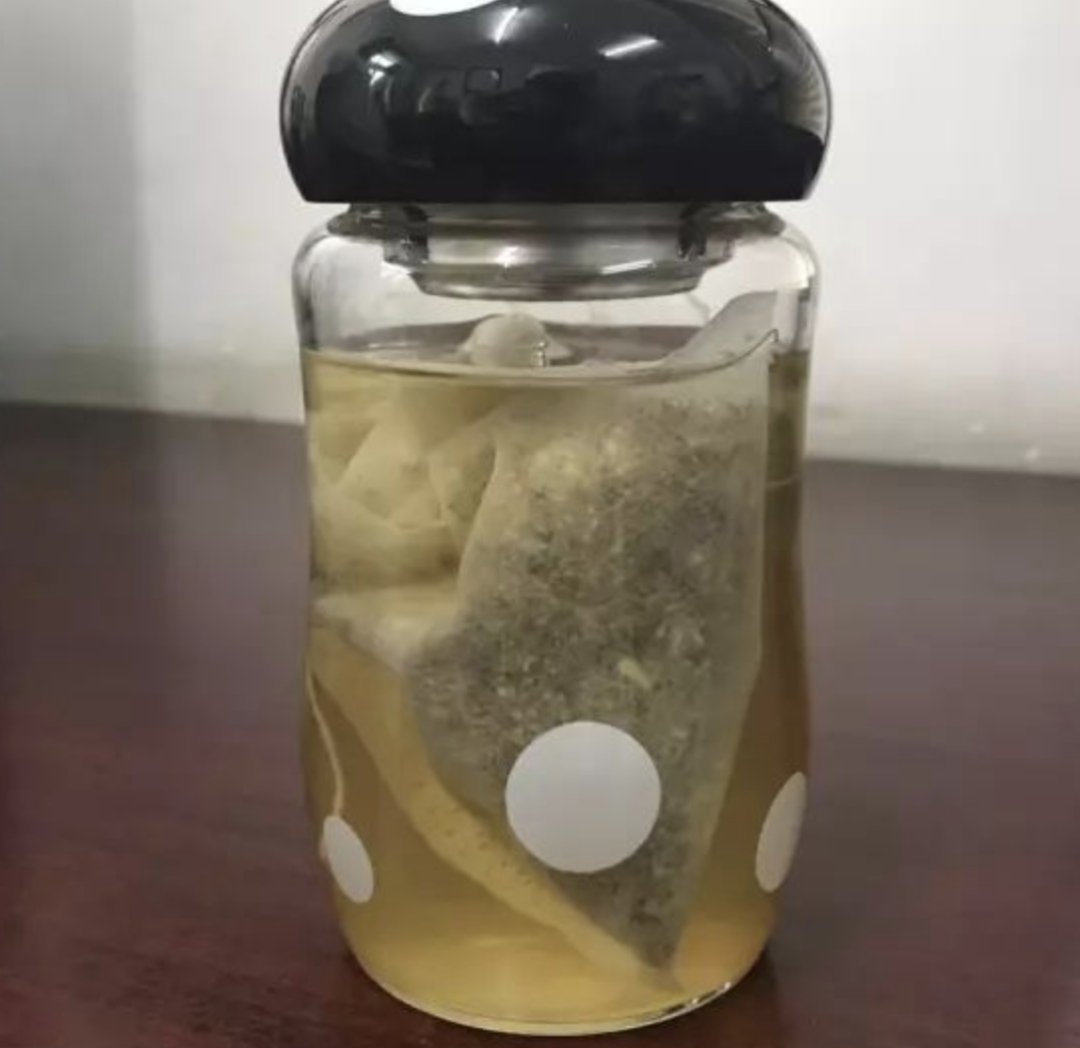
01
Decoction Powder Catalog
CATALOG
01
Bamboo Leaf Decoction
3 liang of dried kudzu, 3 fen (roasted) of licorice, 3 fen of pinellia (with half a cup of ginger juice, boil with one liter of water until reduced to half)
Grind to a coarse powder, take 5 qian each time, with 2 cups of water, 3 slices of ginger, a piece of bamboo leaf, and one jujube, decoct until reduced to 1 cup, strain and take warm.
02
Danggui Drink
Danggui (without the skin), Bai Shao, Chuanxiong, Sheng Di Huang (washed), Bai Jizhi (stir-fried, without the tip), Fang Feng (without the skin), Jing Jie Suo, each 1 liang, He Shou Wu, Huang Qi (without the skin), and licorice (roasted) each 0.5 liang.
Grind to a coarse powder, take 4 qian each time, with 1.5 cups of water, 5 slices of ginger, decoct until reduced to 8 parts, strain and take warm. No time restriction.
03
Shipi Powder
Hou Po (peeled, ginger-prepared, stir-fried), Bai Zhu, Mu Guo (without the pulp), Mu Xiang (not exposed to fire), Cao Guo Ren, Da Fu Zi, Fu Zi (processed, peeled), Bai Fu Ling (peeled), Gan Jiang (processed) each 1 liang, licorice (roasted) 0.5 liang.
Grind to a coarse powder, take 4 qian each time, with 1.5 cups of water, 5 slices of ginger, one jujube, decoct until reduced to 7 parts, strain and take warm, no time restriction.
04
Wen Jing Decoction
Danggui, Chuanxiong, Shaoyao, Gui Xin, Mudan Pi, E Zhu each 0.5 liang, Ren Shen, Gan Cao, Niu Xi each 1 liang.
Grind to a coarse powder, take 5 qian each time, with 1.5 cups of water, decoct until reduced to 8 parts, strain and take warm.
05
Xie Bai Powder
Di Guo Pi (washed and roasted), Sang Bai Pi (finely chopped and stir-fried until yellow) each 1 liang, licorice (roasted) 1 qian.
Grind to a powder, add a pinch of polished rice, with 2 small cups of water, decoct until reduced to 7 parts, take before meals.
06
Qing Xin Lian Zi Drink
Huang Qin, Mai Men Dong (without the heart), Di Guo Pi, Che Qian Zi, licorice (roasted) each 0.5 liang, Shi Lian Rou (without the heart), Bai Fu Ling, Huang Qi (honey-roasted), Ren Shen each 7.5 qian.
Grind to a coarse powder. Each time take 3 qian, with 10 grains of Mai Men Dong, 1.5 cups of water, decoct to 8 parts, strain, cool in water, take on an empty stomach before meals.
07
Gan Lu Drink
Pi Pa Ye (washed), Gan Zhu (washed), Tian Men Dong (without the heart, roasted), Zhi Ke (without the pulp, stir-fried), Shan Yin Chen (without the stem), Sheng Gan Zhu, Mai Men Dong (without the heart, roasted), Shi Hu (without the skin), licorice (roasted), Huang Qin.
Grind to equal parts. Each time take 2 qian, with 1 cup of water, decoct to 7 parts, strain and take warm after meals, before bed. For children, divide the dose into two, adjusting according to age.
08
Hua Gai Powder
Zi Su Zi (stir-fried), Chi Fu Ling (peeled), Sang Bai Pi (roasted), Chen Pi (without the white part), Xing Ren (peeled and pointed, stir-fried), Ma Huang (without the root and joints) each 1 liang, licorice (roasted) 0.5 liang.
Grind these seven ingredients into a powder. Each time take 2 qian, with 1 cup of water, decoct to 7 parts, strain, take warm after meals.
09
San Bi Decoction
Chuan Xu Duan, Du Zhong (peeled, cut, ginger juice stir-fried), Fang Feng, Gui Xin, Xi Xin, Ren Shen, Fu Ling, Danggui, Bai Shao, licorice each 1 liang, Qin Jiao, Sheng Di Huang, Chuan Xiong, Chuan Du Huo each 0.5 liang, Huang Qi, Chuan Niu Xi each 1 liang.
Grind to a coarse powder, take 5 qian each time, with 2 cups of water, 3 slices of ginger, 1 jujube, decoct until reduced to 1 cup, strain and take warm, no time restriction, but take on an empty stomach.
10
Sheng Yang Yi Wei Decoction
Huang Qi 2 liang, Ban Xia (washed with soup), Ren Shen (without the skin), licorice (roasted) each 1 liang, Fang Feng, Bai Shao, Qiang Huo, Du Huo each 5 qian, Ju Pi (with the peel) 4 qian, Fu Ling, Ze Xie, Chai Hu, Bai Zhu each 3 qian, Huang Lian 2 qian.
Grind to a coarse powder, take 3 qian each time, with 5 slices of ginger, 2 jujubes (pitted), with 3 cups of water, decoct until reduced to 1 cup, strain, take warm between breakfast and lunch, avoid cold foods. Gradually increase the dose to 5 qian.
11
Qing Wei Powder
Danggui, Zhi Huang Lian, Sheng Di Huang (wine-prepared) each 3 fen, Mudan Pi 5 fen, Sheng Ma 1 qian.
Grind to a fine powder, make one dose, with 1.5 cups of water, decoct until reduced to 1 cup, strain, take cool.
12
Danggui Liu Huang Decoction
Danggui, Sheng Di Huang, Shu Di Huang, Huang Bai, Huang Qin, Huang Lian each equal parts, Huang Qi double.
Grind to a coarse powder, take 5 qian each time, with 2 cups of water, decoct until reduced to 1 cup, take before meals. For children, reduce the dose by half.
13
Sheng Yu Decoction
Sheng Di Huang, Shu Di Huang, Chuan Xiong, Ren Shen each 3 fen, Danggui, Huang Qi each 5 fen.
Grind to a coarse powder, make one dose, with 2 large cups of water, decoct until reduced to 1 cup, strain, take slightly warm at any time.
14
Wu Yao Decoction
Danggui, licorice, Mu Xiang each 5 qian, Wu Yao 1 liang, Xiang Fu Zi 2 liang (stir-fried).
Grind to a coarse powder, take 5 qian each time, with 2 large cups of water, strain, take warm before meals.
15
Qiang Huo Sheng Shi Decoction
Qiang Huo, Du Huo each 1 qian, Gao Ben, Fang Feng, licorice (roasted), Chuan Xiong each 5 fen, Man Jing Zi 3 fen.
Grind to a coarse powder, make one dose, with 2 cups of water, decoct until reduced to 1 cup, strain, take warm, on an empty stomach before meals.
16
Danggui Blood Nourishing Decoction
Huang Qi 1 liang, Danggui 2 qian (washed with wine).
Grind to a coarse powder, make one dose, with 2 cups of water, decoct until reduced to 1 cup, strain, take warm, on an empty stomach before meals.
17
Hou Po Warming Middle Decoction
Hou Po (ginger-prepared), Ju Pi (without the white part) each 1 liang, licorice (roasted), Cao Dou Kou Ren, Fu Ling (peeled), Mu Xiang each 5 fen, Gan Jiang 7 fen.
Grind to a coarse powder, take 5 qian each time, with 2 cups of water, 3 slices of ginger, decoct until reduced to 1 cup, strain, take warm before meals. Avoid all cold foods.
18
Di Huang Drink
Shu Gan Di Huang, Ba Ji (without the heart), Shan Zhu Yu, Shi Hu, Rou Cong Rong (wine-soaked, roasted), Fu Zi (processed), Wu Wei Zi, Guan Gui, Bai Fu Ling, Mai Men Dong (without the heart), Chang Pu, Yuan Zhi (without the heart) each equal parts.
Grind to a coarse powder, take 3 qian each time, with 1.5 cups of water, 5 slices of ginger, 1 jujube, mint, decoct until reduced to 8 parts, no time restriction.
19
Da Qin Jiao Decoction
Qin Jiao 3 liang, licorice 2 liang, Chuan Xiong 2 liang, Danggui 2 liang, Bai Shao 2 liang, Xi Xin 0.5 liang, Qiang Huo, Fang Feng, Huang Qin each 1 liang, Shi Gao 2 liang, Bai Zhi 1 liang, Bai Zhu 1 liang, Sheng Di Huang 1 liang, Shu Di Huang 1 liang, Bai Fu Ling 1 liang, Chuan Du Huo 2 liang.
Grind these sixteen ingredients, take 1 liang each time, decoct with water, strain, take warm, no time restriction.
20
Qing Shang Juan Tong Decoction
Danggui 1 qian (washed with wine), Chuan Xiong 1 qian, Bai Zhi 1 qian, Xi Xin 3 fen, Qiang Huo 1 qian, Du Huo 1 qian, Fang Feng 1 qian, Ju Hua 5 fen, Man Jing Zi 5 fen, Cang Zhu 1 qian (soaked in rice wash), Pian Qin 1 qian 5 fen (stir-fried with wine), Mai Men Dong 1 qian, licorice 3 fen (raw).
Grind into one dose, decoct with ginger.
21
Qing Fei Decoction
Huang Qin (without the rotten heart) 1 qian 5 fen, Jie Geng (without the skin), Fu Ling (without the skin), Chen Pi (without the white part), Bei Mu (without the heart), Sang Bai Pi each 1 qian, Danggui, Tian Men Dong (without the heart), Shan Zhi, Xing Ren (peeled and pointed), Mai Men Dong (without the heart) each 7 fen, Wu Wei Zi 7 grains, licorice 3 fen.
Grind, decoct with ginger and jujube, take after meals.
22
Yang Wei Decoction
Ban Xia (washed seven times), Hou Po (peeled, ginger juice stir-fried), Cang Zhu (soaked overnight in rice wash, washed and cut, stir-fried) each 1 liang, Ju Hong 7 qian 5 fen, Huo Xiang Ye (washed and dried), Cao Guo (peeled and membraned), Fu Ling (peeled), Ren Shen (without the skin) each 0.5 liang, roasted licorice 2 qian 5 fen.
Grind to a coarse powder, take 4 qian each time, with 1.5 cups of water, 7 slices of ginger, 1 black plum, decoct to 6 parts, take warm.
23
Shi Jue Ming Powder
Shi Jue Ming, Qiang Huo (without the root) each 1 liang, Cao Jue Ming, Ju Hua each 1 liang, licorice (roasted, chopped) 0.5 liang.
Grind these into a powder, take 2 qian each time, with 1 cup of water. Decoct to 6 parts, mix with the residue, take warm after meals and before bed.
Swipe left to see more
Historical Origins
Decoction Powder
According to the earliest records, decoction powder is mentioned in the “Fifty-Two Disease Formulas”, but the term “decoction powder” was named in the Tang Dynasty by Sun Simiao in the “Emergency Essentials of the Thousand Gold Formulas”, which recorded decoction powders such as Du Huo Decoction Powder, Fu Shen Decoction Powder, Yuan Zhi Decoction Powder, etc. The application of decoction powder peaked during the Song Dynasty, to the extent that it was said, “In recent times, all are powders, thus forgetting the decoction method.” After the Ming and Qing Dynasties, due to the oversupply of herbal resources, decoction powder gradually gave way to sliced herbs. However, many famous powder formulas are still in use today, such as Yu Ping Feng San, Si Ni San, etc.
Characteristics of Decoction Powder
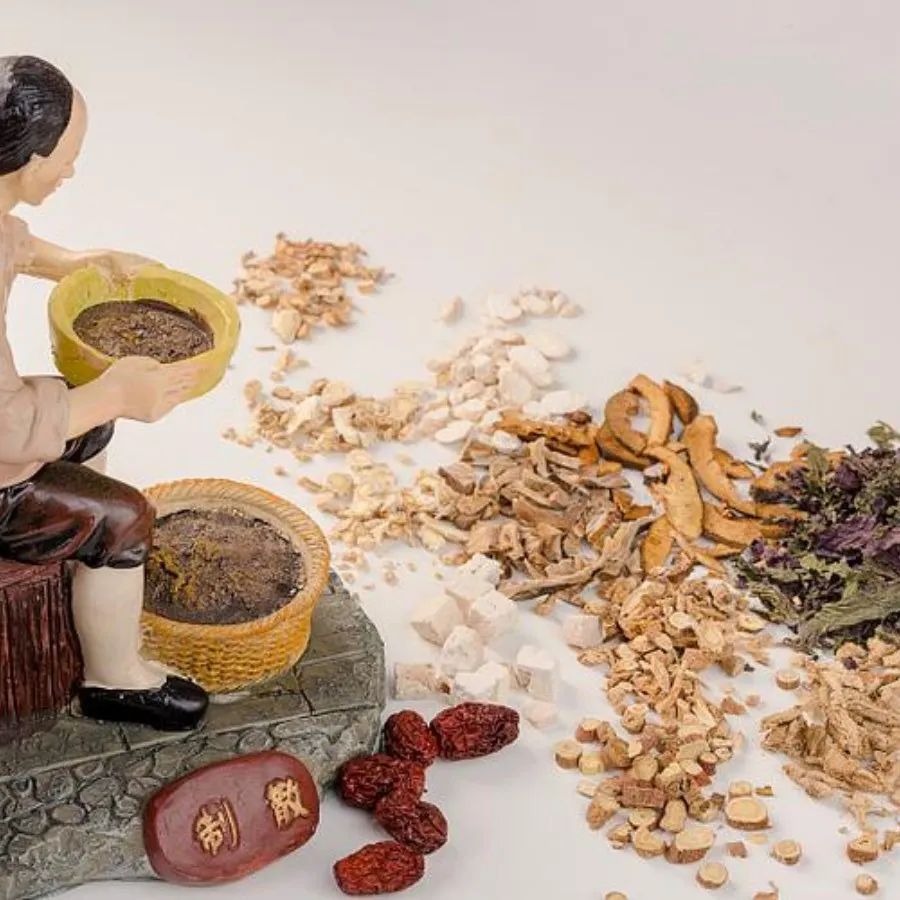
1
Advantages
① The powdered form of the medicine has a uniform texture, with a larger contact area with the solvent compared to traditional sliced herbs, making it easier for the active ingredients to dissolve, saving herbal resources, and stabilizing the properties of the decoction.
② Traditional Chinese Medicine decoction powder can extract effective components in a shorter time, avoiding the loss of volatile components that may occur during prolonged boiling, such as coumarins, terpenes, glycosides, and essential oils.
2
Disadvantages
① Decoction powder, in its coarse powder form, presents challenges in identifying the herbs compared to sliced herbs, and the coarse powder can easily become gelatinous and produce a cloudy decoction after boiling.
Comparison of Decoction Powder and Powder
01
Decoction Powder
·Crushed medicinal materials to a certain particle size, packaged or measured for use, boiled with water or a guiding agent, taken together with the powder or strained.
·Common dosage is 6 to 30 g
·Liquid preparation
·Components dissolved after decoction
·Mainly applied to plant medicines
·Yu Ping Feng San
02
Powder
·Raw medicinal materials or suitable excipients crushed and uniformly mixed into a dry powder, divided into oral powders and topical powders.
·Common dosage is below 6 g
·Solid preparation
·Application of all components of sliced herbs
·Used for mineral medicines unsuitable for decoction
·Contains cow bile and cinnabar for calming powders
Swipe left to see more
The resource-saving and efficiency-enhancing Traditional Chinese Medicine decoction powder deserves attention. With the advancement of modern research and instrumental testing technology, decoction powder is expected to play a significant role in clinical applications in the future.
References
[1] Xie Feifei, Lu Xiaoying, He Guangming, et al. Historical Origins, Application Characteristics, and Modern Research Progress of Traditional Chinese Medicine Decoction Powder [J]. Central South Pharmacy, 2024, 22(01): 180-185.[2] Yuan Lianhua, Kuang Xiaohong, Yuan Jiawen. Standardization Research on the Decoction of Traditional Chinese Medicine Decoction Powder [J]. Guangming Traditional Chinese Medicine, 2019, 34(18): 2794-2796.[3] Jiao Qishu, Hao Lixia, Wu Zhili, et al. Discussion on the Particle Size of Decoction Powder and Powder in Classic Famous Formulas [J]. Chinese Journal of Experimental Formulas, 2021, 27(01): 1-6.[4] Tong Xiaolin, Zhang Jiacheng, Mu Lancheng, et al. Restoring Decoction Powder to Save Herbal Materials [J]. Chinese New Medicine Journal, 2012, 21(05): 470-474.
–END–
Images in this article are sourced from the internet for public welfare dissemination. Thanks to the authors of the images; if there is any infringement, please contact us for removal.

This article is an original work of “PSM Medicine Shield Public Welfare”; for reprints, please leave a message.
Review Expert: Wei Li, Director, Guangdong Pharmaceutical Association, First Affiliated Hospital of Guangzhou Medical University



SearchArticles related to Traditional Chinese Medicine Decoction Powder

